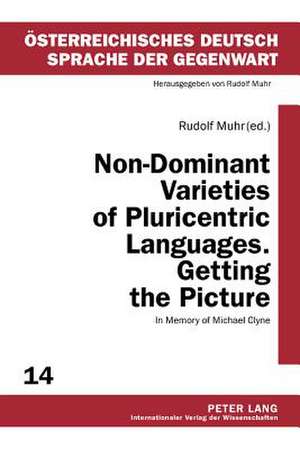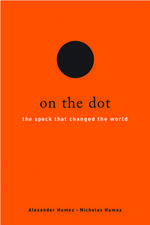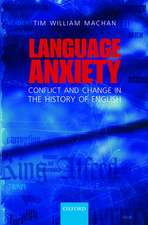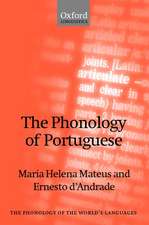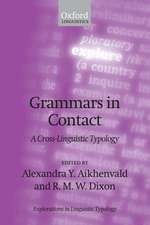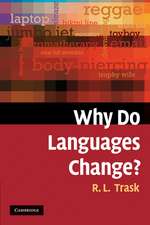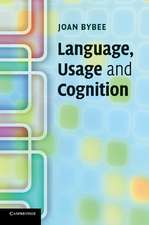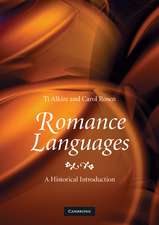Non-Dominant Varieties of Pluricentric Languages. Getting the Picture: Oesterreichisches Deutsch - Sprache Der Gegenwart, cartea 14
Editat de Rudolf Muhren Limba Engleză Hardback – 8 mar 2012
Preț: 557.69 lei
Preț vechi: 606.18 lei
-8% Nou
Puncte Express: 837
Preț estimativ în valută:
106.71€ • 111.72$ • 88.30£
106.71€ • 111.72$ • 88.30£
Carte tipărită la comandă
Livrare economică 01-07 aprilie
Preluare comenzi: 021 569.72.76
Specificații
ISBN-13: 9783631620243
ISBN-10: 3631620241
Pagini: 498
Ilustrații: Illustrations
Dimensiuni: 20 x 154 x 35 mm
Greutate: 0 kg
Ediția:Nouă
Editura: Peter Lang Gmbh, Internationaler Verlag Der W
Seria Oesterreichisches Deutsch - Sprache Der Gegenwart
ISBN-10: 3631620241
Pagini: 498
Ilustrații: Illustrations
Dimensiuni: 20 x 154 x 35 mm
Greutate: 0 kg
Ediția:Nouă
Editura: Peter Lang Gmbh, Internationaler Verlag Der W
Seria Oesterreichisches Deutsch - Sprache Der Gegenwart
Notă biografică
Rudolf Muhr is the founder and director of the Austrian German Research Center and a member of the Center for Plurilingualism at Graz University. He worked in the fields of linguistics and German as a foreign or second language. The focus of his research and his teaching activities is on sociolinguistics and pragmatics.
Cuprins
Contents: John Hajek: Homage to Michael Clyne: linguist, colleague and advocate - Rudolf Muhr: Linguistic dominance and non-dominance in pluricentric languages. A typology - Catrin Norby/Camilla Wide/Jan Lindström/Jenny Nilsson: Finland Swedish as a non-dominant variety of Swedish - extending the scope to pragmatic and interactional aspects - Carla Amorós/Carmen Fernández/Natividad Hernández/Emilio Prieto: Difficulties in defining the standard Spanish lexicon - Nils Langer: Finding non-dominant languages in the nineteenth century - problems and potentials from historical sociolinguistics - Chiara Messina: Researching a Language for Special Purposes within a Non-Dominant Variety: Problematic Issues and possible Ways Out. An Overview based on the Example of Austrian German - Heinz L. Kretzenbacher: The emancipation of Strine: Australian English as an established post-colonial national standard of English - Johan De Caluwe: Dutch as a bi-centric language: a lexicographic (r)evolution - John Hajek: (Non-)dominant varieties of a (non-) pluricentric language? Italian in Italian and Switzerland - Marilena Karyolemou: Cypriot Greek as a non-dominant veriety of Greek - Jasmine Dum-Tragut: Amen tel hay kay. 20 years later - Pluricentric Armenian and its changed dominance hierarchy - Salvatore del Gaudio: The Russian Language in Ukraine: some unsettled questions about its status as a 'national' variety - Curt Woolhiser: «Belarusian Russian»: Sociolinguistic Status and Discursive Representations - Domergue Sumien: Occitan: harmonizing non-dominant standards throughout four states - Josep-Àngel Mas: Catalan as a pluricentric language: the Valencian case - Esther Nuñez Villanueva: The role of the media in standardising a regional variety: the case of Canal Sur and Seville Spanish in the pluricentric debate - Maria Eugenia L. Durate: When speech and writing are too far apart. Non-dominant features of Brazilian Portuguese becoming dominant - Aline Bazenga: Variation in subject-verb agreement in an insular variety of European Portuguese - Ana Raquel Simões/Sara Sousa: Language teachers' practices, representations and knowledge on intralinguistic diversity: a case study in Portugal - Dawn Marley: Competing varieties of French and Arabic in Morocco - Abderrazaq Msellek: Sociolinguistic Aspects of Moroccan Arabic - Munirah Alajlan: Dominant and Non-Dominant Varieties in the Gulf: Social Class or Region? - Zeinab Ibrahim: Egyptian Revolution 2011 Slogans: Intuitive Language Choices between Dominant and Non-Dominant Varieties of Arabic - Simone Ashby: Co-producers of this means of expression': Evidence from Mozambique in support of the study of indigenizing languages - Aditi Ghosh: Bhojpuri as a non-dominant variety of Hindi - Adrian Tien: Chinese Hokkien and its lexicon in Singapore: evidence for an indigenised Singapore culture - Jidda Hassan Jumma'a: Nigerian English: Linguistic, sociolinguistic and conversational characteristics in the framework of dominance/non-dominance - Kelen Ernesta Fonyuy: Attitudes toward less Dominant Accents of Cameroon English.
